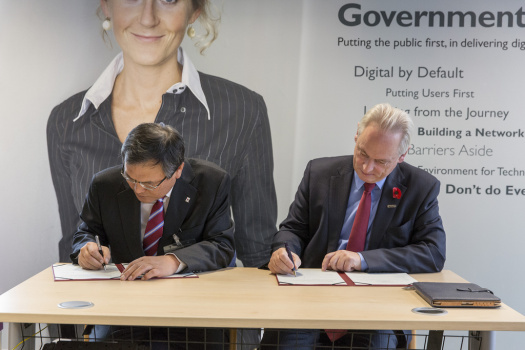On my recent trip to Korea, I was hugely impressed by the technological innovation on display and by the progress on the digital development of the public sector. That why it was a pleasure yesterday to see GDS host a ceremony for the signing of Memorandum of Understandings between the UK and Republic of Korea.
A memorandum of understanding is a written agreement between two parties - in this case, two governments - that sets out the principles for cooperation. The three agreements on digital collaboration were signed by Francis Maude, Minister for the Cabinet Office and Choi, Mun Kee, Minister of Science, ICT and Future Planning.
The focus of the agreements is on technical standards and building digital government services based on open principles. The ceremony coincided with the State Visit to the UK of the President of the Republic of Korea, Park Geun-hye.

As demonstrated in last month’s Conference on Cyberspace in Seoul, we have much in common with Korea, but we also have much to learn from each other. Yesterday’s signing commits both of our countries to creating digital public services that put the needs of the citizen first, and I’m excited that we’ll be working more closely together.
Follow Liam on twitter: @liammax


1 comment
Comment by simon posted on
Thanks for this Liam.
Could you compile a list of these "top down" (bilateral) MOU's somewhere (like the OGP site), just so that we can share them with the "bottom up". Things are moving so fast, as the opengovernment National communities begins to follow the openresearch Global ones, so it would be good to have one page which all silos could use as a reference (even if it's just a link off the OGP wikipedia page).
I'll just point you to the terena's manager's group archive, as there are a bunch of things happening in the Brussels bubble, which will eventually need popping. I'm taking it you are using the UN list for targetting progressive (e)governments.
You might appreciate that I'm taking the perspective of tracking the development of inter-National Research and Education Networks (NREN). So you'll find that many of the open access tools your inter-government groups will want, in order to collaborate (like eduroam and WAYF), are fairly mature now.
But they'll need to cherry pick from each National silos version of the collaboration tools, and of course they'll be some standards and policies to agree upon. The network guys on your Advisory boards ought to keep across this European NREN manager's list. It's where bilaterals might become multi-laterals. https://www.terena.org/mail-archives/tf-msp/ (as if many informal agreements/arrangements weren't already in place already:) All the best.